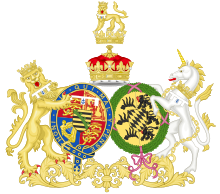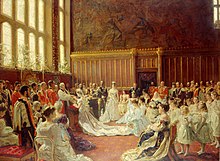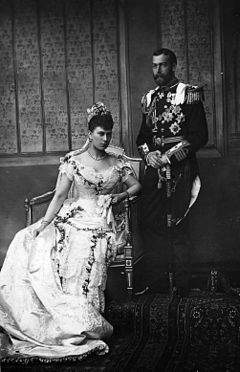|
Wedding of Prince George and Princess Victoria Mary
On 6 July 1893, Prince George, Duke of York (later King George V), and Princess Victoria Mary of Teck (later Queen Mary) were married at the Chapel Royal, St. James's Palace, in London, England. EngagementPrincess Victoria Mary of Teck's engagement to Prince Albert Victor, Duke of Clarence and Avondale, eldest son of the Prince of Wales, ended with the duke's death on 14 January 1892.[1] Even before the duke's death, his grandmother Queen Victoria had wanted to ensure the succession, and consequently desired that his younger brother and (now second-in-line to the throne) Prince George marry either Princess Marie or Princess Victoria Melita of Edinburgh. For his part, George was fond of his cousins, but did not want to marry early; "I still think marrying too young is a bad thing," he wrote to the Queen, and cited the circumstances surrounding the death of Rudolf, Crown Prince of Austria, as an example. Furthermore, the prince made it known, "The one thing I never could do is to marry a person that didn't care for me. I should be miserable for the rest of my life".[2] In 1892 however, a tentative proposal of marriage was put forward to Marie's parents, but as she was influenced by her Anglophobe mother and governess, Marie rejected him.[3] His grandmother Queen Victoria was fond of the Duke of Clarence's fiancée, and made known her wish for Mary to wed his brother George (now the Duke of York). The situation was embarrassing for the couple, as the country expected their engagement and contemporary newspapers speculated wildly on the affair. Mary was still mourning the duke's death, but faced the intense pressure of her parents, among others.[4] George on the other hand was faced with the reality of his new position as second-in-line to the throne, and had lost self-confidence after Marie's refusal.[5] He had no idea what Mary's real opinion was towards him, and consequently had some misgivings; George was urged to propose to Mary after spending time with his beloved aunt Queen Olga of the Hellenes.[6] Despite this background, the couple came to care deeply for each other, and their marriage would be a success. Several awkward encounters with Prince George went by, always in the company of others, with both individuals remaining embarrassed and shy. On 3 May 1893, Mary arranged to have tea with George's sister Princess Louise, Duchess of Fife, and her husband, but when she arrived, she found George there as well. The awkward moment was saved after Louise interceded, "Now Georgie, don't you think you ought to take May into the garden to look at the frogs in the pond?" George proposed beside the pond, and their engagement was officially announced the following day.[7] ProtestsThe Socialist League, an anarchist group, campaigned against the cost of the wedding, putting up posters which stated: "The London Anarchists will hold an indignation meeting Sunday, July 2nd, in Hyde Park, at half-past-three, to protest against the waste of wealth upon these Royal Vermin, while the workers are dying of hunger and overwork. Fellow workers, prepare for the Revolution. Remember - He who would be free himself must strike the blow. Down with Flunkyism." Thomas Cantwell and Ernest Young, members of the group, were caught flyposting and were arrested and held in prison. Their offices were searched, but the case was ultimately dismissed.[8] Wedding Prince George, Duke of York, and Princess Victoria Mary of Teck were married at 12:30 on 6 July 1893 at the Chapel Royal at St James's Palace.[9][10] Their wedding was the first royal wedding to take place in St James's Chapel since the death of Prince Albert in 1861, which plunged Queen Victoria into deep mourning. Most of Albert and Victoria's own children were married in St George's Chapel, Windsor Castle, in relative seclusion.[11] On the morning of their wedding, George accidentally caught sight of his fiancée down a long corridor of Buckingham Palace; he proceeded to make a "low and courtly bow," a gesture Mary never forgot.[12] The royal parties were brought from Buckingham Palace to St James's in four large carriage processions, consisting of open landaus. The first procession included members of the household; this was followed by the Duke of York and his supporters in the second and Princess Mary, the Duke of Teck and Prince Adolphus of Teck in the third. The final procession included Queen Victoria, the Duchess of Teck and Princes Frederick and Alexander of Teck.[9][13] The first public royal wedding in 32 years drew large numbers of spectators, many of whom gathered in the route from Buckingham Palace to St James's Palace to give the couple an "enthusiastic reception".[11] Mary greeted the crowds' applause with her "side-ways smile," and with "a little nervous gesture of her white-gloved right hand".[14][9][15][16] Princess Victoria Mary was attended by five bridesmaids and five junior bridesmaids:[11] George's sisters Princesses Victoria and Maud of Wales; and his first cousins Princesses Victoria Melita, Alexandra, and Beatrice of Edinburgh; Princesses Margaret and Patricia of Connaught; Princesses Alice and Victoria Eugenie of Battenberg; and Princess Helena Victoria of Schleswig-Holstein.[12] Each bridesmaid received a brooch from the groom.[17] The Duke of York's two supporters were the Prince of Wales and the Duke of Edinburgh.[9] The Archbishop of Canterbury performed the ceremony, and was assisted by the Bishop of London, the Bishop of Rochester, and five other prelates. George and Mary then proceeded to Buckingham Palace, where Queen Victoria made a rare public appearance on the balcony along with the Duke and Duchess.[11] The marriage register was signed by the Queen, the prime minister, and all other royal personages present.[16] The three-tier wedding cake was adorned with fern, white roses, and nautical decorations.[17] Upon their marriage, Mary became styled as Her Royal Highness The Duchess of York. They spent their honeymoon at Sandringham, the Prince of Wales' estate in Norfolk,[16] before going to Osborne House to stay with the Queen.[11] Wedding dress Upon the announcement of the engagement, Arthur Silver of the Silver Studio, was approached to design the wedding dress. Silver had designed the dress for Princess Mary's intended wedding to the Duke of Clarence and Avondale, in 1892. This 'Lily of the Valley' creation had been made public just days before the Duke of Clarence's untimely death in January 1892 but had to be completely abandoned.[18] The design chosen for the York-Teck wedding was 'The May Silks'; the dress would feature embroidery of the emblems of a rose, shamrock and thistle, and be trimmed with the traditional orange blossom and true lovers knots.[19] The dress itself was put together by Linton and Curtis of Albemarle Street, London.[20] The front of the dress was made of white satin, featuring three small flounces old Honiton lace which had been used on the wedding dress of her mother.[21] The bodice, cut at the throat, was long and pointed and was made of white and silver brocade, also featuring a small amount of her mother's Honiton lace near the top and on the upper part of the sleeve.[22][23] The veil, previously used by her mother was fastened with diamond pins gifted by Queen Victoria.[24] Matching the orange blossom elements to the dress, small wreaths were placed all the way around the bust and on the hair. Princess Mary completed the wedding outfit with a diamond tiara from Queen Victoria; diamond rivière necklace from the Prince and Princess of Wales; and diamond earrings and anchor brooch, a wedding gift from Prince George.[25] GuestsGroom's family
Bride's family
Other foreign royalty
Envoys and ambassadors
Ministers
Royal household
ClergyOther guests
References
Sources
|
||||||||||
